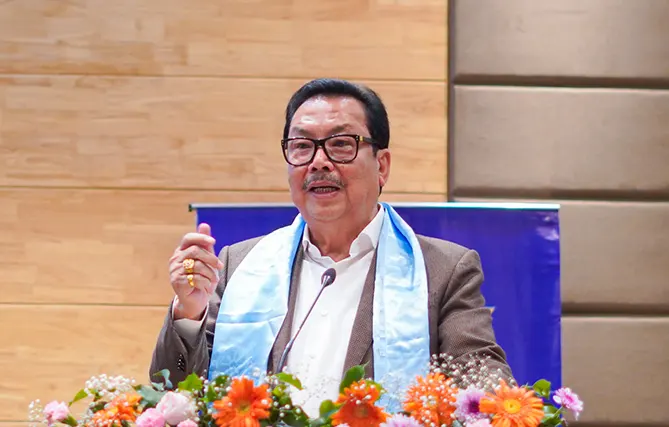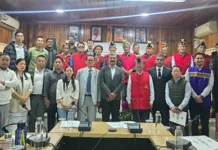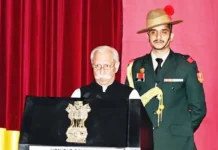ITANAGAR, 3 Dec: Deputy Chief Minister Chowna Mein emphasised the importance of improving foundational literacy and numeracy skills of the children in the region.
Addressing the inaugural session of the first-ever regional workshop on improving education key performance indicators (KPI) in the aspirational districts and blocks for northeastern states, Jammu & Kashmir and Jharkhand here on Tuesday, Mein said that he was delighted to host such a distinguished gathering of experts, officials, and development partners who have come together to address the unique challenges and opportunities in education in the Northeast region.
“Education is a top priority, and I am confident that this workshop will help us enhance learning outcomes and provide the best opportunities for our students by addressing critical challenges in education-ranging from reducing dropout rates to enhancing infrastructure
and teachers’ training,” he said, adding that “with collective efforts and insights from this workshop we will achieve transformative progress in our learning outcomes.”
The DCM expressed gratitude to the NITI Aayog, a key development partner of Arunachal Pradesh, for its continued support in achieving the state’s sustainable development goals.
“NITI Aayog’s collaboration has been instrumental in shaping policies around poverty alleviation, gender equality, clean water, and improving the educational landscape,” he said.
“The last two terms under the dual-engine government have been transformational. We have witnessed a remarkable 136% increase in gross state domestic product, a 104% rise in per capita income, and a 200% increase in capital expenditure, amongst other achievements,” Mein said.
He said that the state has received significant support from the government of India with Rs 150 crores allocated for the construction of 30 government secondary and higher secondary schools across the state. An additional amount of Rs 150 crores will be used to complete ‘golden jubilee schools’ in 2024-25, and approximately Rs 600 crores have been approved for various educational interventions under the Samagra Shiksha scheme, the DCM said.
“Education being a priority sector, we have taken the pledge to transform our educational landscape through significant modernisation and innovation. Towards this, in this year’s budget, we have cumulatively earmarked Rs 2,139 crores for the Arun Shri mission,” he informed.
Apart from the progressive measures undertaken to strengthen the educational sector, Mein also acknowledged the limitations of the current education infrastructure, citing that it is still lagging behind the rest of the country, and that bridging this gap is critical for future growth. He sought support from the the NITI Aayog to upgrade the educational infrastructure built during the NEFA days, saying that it would immensely help in enhancing the educational scenario of the state.
NITI Aayog member Dr Arvind Virmani emphasised the transformative role of digital connectivity in revolutionising education, especially in remote regions like Arunachal.
He described artificial intelligence and digital tools as “force multipliers” that could enhance teaching and learning outcomes.
Calling for innovative, tech-driven solutions, he stressed the need to address systemic challenges and ensure modern, accessible education for underserved communities, preparing students for a future fuelled by knowledge and innovation.
NITI Aayog Additional Mission Director (ABP)Anand Shekhar highlighted the workshop’s focus on bridging the infrastructure gap, teacher training, pedagogy improvement and addressing dropout rates. He introduced the 4Ps of intervention: political will, public finance, partnerships and people-centricity, as the guiding framework for the initiative.
During the discussions, DoNER Secretary Chanchal Kumar emphasised the infrastructural challenges faced by schools in the Northeast. He pointed out the need for functional school facilities, gender parity and improved teacher skills in digital education. Highlighting the importance of community involvement, he urged district collectors to organise digital literacy campaigns and foster dialogue between parents, communities, and school administrations to improve learning outcomes.
Union Education & Literacy Department Secretary Sanjay Kumar underscored the importance of convergence with other ministries to bridge gaps not addressed by the Samagra Shiksha Abhiyan.
The introduction of the National Curriculum Framework-2020, aligned with NEP-2020, was also discussed, alongside challenges in foundational literacy and secondary school infrastructure. He highlighted issues like, introduction of new textbooks for Classes 3, 6, and 9, Vidya Samiksha Kendra initiative to improve digital connectivity and inclusivity, and encouragement for Vidyanjali, a school volunteer initiative for community, NGO, and CSR participation.
Arunachal Pradesh Chief Secretary Manish Gupta spoke about the successful implementation of 12 EMRS schools in the state and the focus on developing infrastructure and regularising teachers.
NITI Aayog Aspirational Districts Programme Regional Lead Dr Priscilla C Ngaihte also spoke.
The workshop was attended by, among others, MLA Zingnu Namchoom, NITI Aayog officials, DCs, DPOs and BEOs from aspirational districts from northeastern states. (With input from DCM’s PR Cell)




